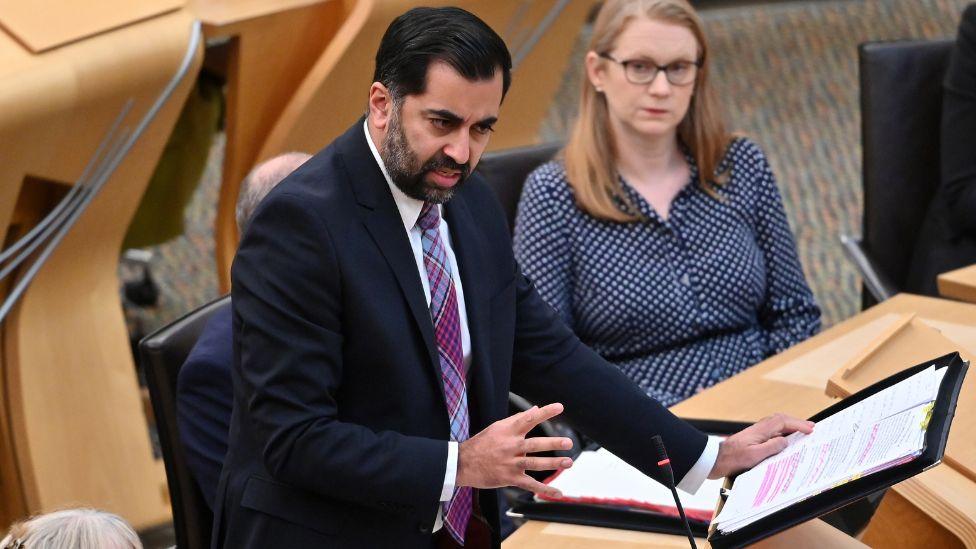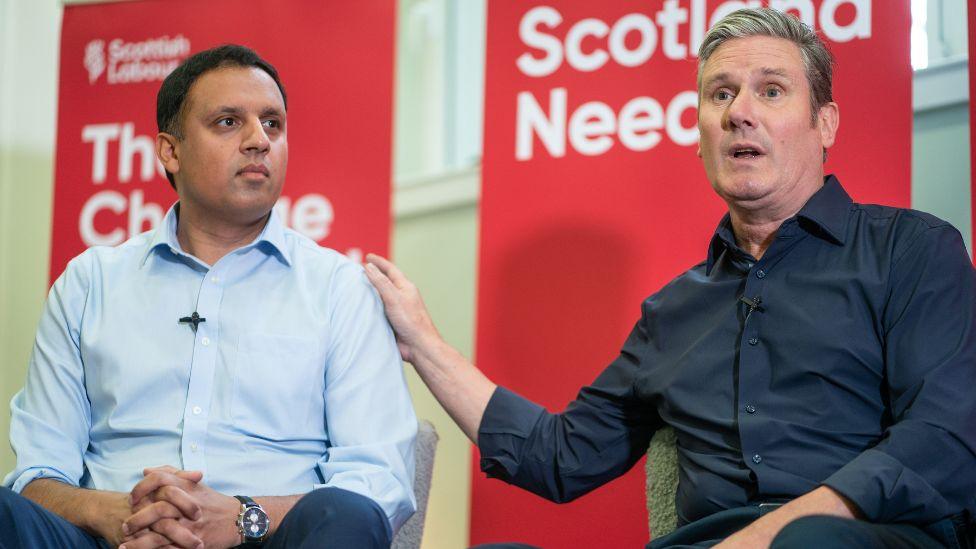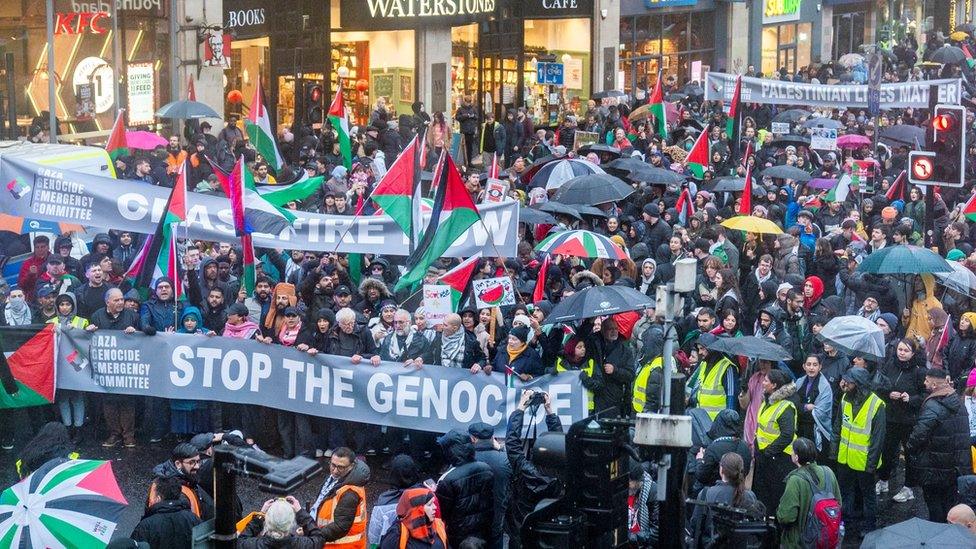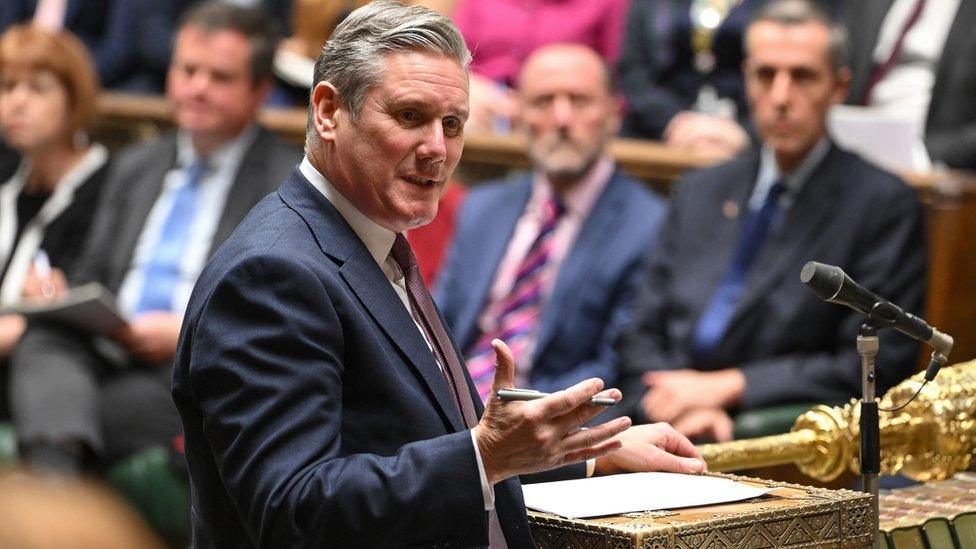Humza Yousaf urges PM to recognise Palestinian state
- Published

First Minister Humza Yousaf tabled the ceasefire motion
Scotland's first minister has urged the UK government to recognise a Palestinian state.
In a letter to Prime Minister Rishi Sunak, Humza Yousaf said the move would help to end the "political impasse" in the Middle East.
It came as MSPs backed his motion to the Scottish Parliament by 90 votes to 28 to call for an immediate ceasefire in the Israel-Gaza conflict.
The motion won the support of all parties except the Conservatives.
They called for "humanitarian pauses" instead. That is the position taken by the UK government and the UK Labour leader Sir Keir Starmer - though Scottish Labour want a ceasefire.
Ahead of the debate, Mr Yousaf wrote a letter to Mr Sunak urging him to recognise a Palestinian state within the borders set out in 1967.
A similar letter was also sent to Sir Keir, urging him to back the calls.
The first minister said the move would help to end the "political impasse that has condemned Israelis and the Palestinians to successive cycles of violence".
Mr Yousaf, whose parents-in-law recently escaped Gaza, told MSPs: "It's only with full recognition of Palestine as a state in its own right that we can truly move forward towards a two-state solution."
The UK government previously said, external it would only recognise a Palestinian state at the "right time".
A spokesperson for the Foreign, Commonwealth and Development Office said: "As the prime minister has said, we continue to support a just solution to the conflict for both sides and remain committed to a two-state solution that protects the peace and security of both Israelis and Palestinians, with the West Bank and Gaza part of a viable and sovereign Palestinian state."
While 138 UN members, including nine in the EU, recognise a Palestinian state, the United States and most large European countries do not.
However, Spanish prime minister Pedro Sanchez said last week that his government would seek to recognise Palestinian statehood.

Gaza authorities say 13,300 people, including more than 5,000 children, have been killed since a cross-border Hamas attack on October 7
The SNP motion, external said the parliament condemned the"barbaric and unjustifiable terrorist attacks" by Hamas on 7 October and the killing of civilians, including women and children, in Israel's siege of Gaza.
It called for hostages to be released, humanitarian aid to be increased, international law to be upheld and for a two-state peace solution.
The motion also expressed "solidarity with Scotland's Jewish, Muslim and Palestinian communities and condemns antisemitism, Islamophobia or any other form of hatred".
The first minister said that while Israel had the right to defend itself, it must respect international law.
'Nightmare of unimaginable terror'
Mr Yousaf said that doctors in Gaza, including his brother in law, were being forced to carry out "medieval" procedures without proper supplies of anaesthetics.
"In the face of such destruction, death and inhumanity, an immediate ceasefire, agreed by all sides, is needed to ensure the protection of innocent civilians and the delivery of essential supplies," the first minister said.
He insisted "humanitarian pauses" were not sufficient.
"Simply a pause in the killing of innocent men, women and children only, what, to resume a few hours later? Surely we must and can strive for better than that," Mr Yousaf added.
"For the sake of the people of Gaza who are living in a nightmare of unimaginable terror and for the Israeli hostages who remain captive, this parliament and the international community must unite and call for an immediate ceasefire."
Since the Holyrood motion was passed, Israel and Hamas have agreed a deal to release 50 hostages being held in Gaza during a four-day pause in fighting. However, Hamas has reportedly vowed to carry out further attacks like that of 7 October.
Israeli Prime Minister Benjamin Netanyahu said his country would not stop fighting until all the hostages were brought home.
Israel began attacking Gaza after Hamas fighters crossed the border on 7 October, killing 1,200 people and taking more than 200 others hostage.
Gaza's Hamas-run health ministry has said 13,300 people, including more than 5,000 children, have been killed in Israel's campaign.
A Scottish Labour amendment, tabled by Anas Sarwar and backed by the SNP, stated it would require "all sides to comply" with a ceasefire and called on the International Criminal Court to investigate both sides of the conflict. It was passed by MSPs.
The call for a ceasefire put Scottish Labour at odds with Sir Keir, who has instead called for "humanitarian pauses".

Scottish Labour chief Anas Sarwar has backed a ceasefire, while UK Labour leader Sir Keir Starmer supports "humanitarian pauses"
Mr Sarwar told MSPs: "For a ceasefire to work, all sides must be willing to comply.
"And secondly we must recognise that Hamas has made clear that it intends to repeat the October 7 massacre, intends to continue rocket fire, and tragically, Israeli Prime Minister Benjamin Netanyahu has made clear that he is not willing to even consider a ceasefire.
"That's why the full force of international diplomacy must be used to create the conditions to make an immediate ceasefire a reality."
UK Labour leader Sir Keir has argued that a ceasefire would not be appropriate because it would freeze the conflict and embolden Hamas.
He saw 56 of his MPs rebel last week as they backed an SNP motion calling for an immediate ceasefire in the House of Commons. Both Scottish Labour MPs - Ian Murray and Michael Shanks - abstained.
'Hamas won't respect ceasefire'
The Scottish Greens and Scottish Liberal Democrats supported the ceasefire demand, while the Tories instead backed "humanitarian pauses to deliver aid to Gaza safely and in a sustained way". The party's amendment was rejected by MSPs.
Compared with a formal ceasefire, such pauses tend to last for short periods of time, sometimes just a few hours.
Scottish Conservative MSP Donald Cameron told the chamber that a ceasefire was opposed by the US government, as well as the UK leadership of the Conservative and Labour parties.
"A ceasefire requires both of the two opposing sides to support it and regrettably it has been clear for some time now that Hamas will not respect a ceasefire," he said.
"Hamas does not even respect the right of Israel to exist, let alone work towards peace."

More on Israel-Gaza war
From Gaza: Giving birth with no painkillers under the bombs in Gaza
From Israel: Hostages' fates haunt Israel as Gaza war intensifies
Explained: The faces of hostages taken from Israel
History behind the story: The Israel-Palestinian conflict
- Published18 November 2023

- Published16 November 2023
